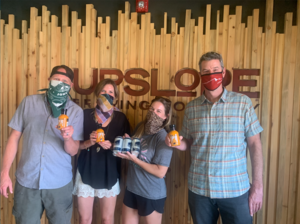
The second annual Colorado Inno on Fire list is here.
Today, we’re officially announcing the 50 people and companies that are crushing it across the Colorado tech and startup ecosystem. Over the next few weeks, we’ll spotlight a few of these companies in stories and in our newsletter, The Beat.
At a virtual event on October 20, we’ll announce the seven people and companies, one from each category, that a panel of esteemed judges have selected as the Inno Blazer winners (AKA category winners).
Now, what makes a company or individual on fire?
We’re looking at startups that have had a banner year. People and companies that brought on new funding, launched products, made hires or offered an innovative approach to solving the most challenging problems. Inno on Fire is designed to showcase those who are making the biggest impact on our local ecosystem.
Winners span industries from health care to software to crisis innovators, with some just getting off the ground and others with a decade of progress at their backs.
This year’s list features people and companies that were forced to be more resilient than ever before. Covid-19 challenged these companies in ways they couldn’t foresee and made growth that much harder. The people and companies on this list persevered, showing the true mettle and strength behind their businesses.
Winners were sourced by nominations and selected by the Colorado Inno editorial team. Let’s get to the list…
Early Stage
Denver-based Manatee, a startup integrating pediatric behavioral health therapy into the daily lives of families, had a big first full year. The company closed a $1.5 million seed investment round in June. Manatee family app gamifies therapy and enables continuous support for kids by setting, reminding and tracking their treatment goals. Since launching in 2019, the company has won the Prime Health Challenge, been a part of the Children’s LA Digital Health Lab and HLTH startup competition, partnered with eight health systems and launched a research study with Children’s Hospital Los Angeles’ USC Center for Excellence in Developmental Disabilities. And, as Covid-19 hit, Manatee and its co-founder and CEO Damayanti Dipayana, provided its technology free for three months.
In just the last six months, Buderflys, a startup developing a more comfortable and better-fitting headphone, closed its first round of funding at $800,000, signed a partnership agreement with one of the largest spoken word brands in the world and pre-sold $3.75 million of product. And amid the pandemic, the company was also awarded $250,000 from the Colorado Office of Economic Development and International Trade Advanced Industries Accelerator Grant Program. The Denver-based company is developing earbuds made of a malleable material that allows for better earbud fit and comfort. The better seal in the ear improves audio quality and comfort, founder Shea Gerhardt said, as Buderflys' initial target customers will be those who are listening mainly to spoken content like podcasts and audiobooks.
While in college, Curu co-founders Abb Kapoor and David Potter began helping students, immigrants and others build and maintain credit. But, as their client list grew, they sought an automated solution and launched what is now Curu. After several iterations, company relocations, accelerator programs and small rounds, the company closed a $3 million seed round in May and put down permanent roots in Denver. Since launching, Curu has repositioned itself as a B2B product, offering an automated lead recovery solution enabling lenders to fund more loans. In March, Curu went live with its first enterprise partner, Bank Novo, and launched with its second partner, LendKey, in May. With Curu, loan applicants who typically would be rejected by lenders are given a soft landing, receiving personalized recommendations on actions they need to take to be approved sooner.
Just as the impacts of Covid-19 were being felt here in the U.S. at the start of March, Denver SaaS startup StackHawk closed a $2.5 million financing round. The round was co-led by Costanoa Ventures and Foundry Group, along with Flybridge Capital and Matchstick Ventures, bringing the company’s total funding to $4.6 million since July 2019. Then, in September, StackHawk officially launched its product to the general public, helping engineers find and fix application security bugs at any stage of the development pipeline. The company, co-founded by Joni Klippert, also made a crucial hire in July, bringing on Simon Bennetts, founder of Zed Attack Proxy (ZAP). The company was previously named to Colorado Inno’s 20 Startups to Watch in 2020 list.
This year has been challenging and rewarding for Denver’s soona, as the company brought on a crucial round of funding in February, navigated Covid-19 related closures and expanded into a new city. The content creation startup, led by Liz Giorgi and Hayley Anderson, closed an oversubscribed $3.5 million seed 2 round to kick off the year, as it eyed an Austin expansion. Then, Covid-19 hit, and the company was forced to shut down its in-person experience, putting increased importance on the company’s digital content solutions. Despite the challenges caused by the global pandemic, soona persevered and recently opened its Austin location. The company was previously named to Colorado Inno’s 20 Startups to Watch in 2020 list.
Boulder-based Bond Pet Foods has been developing animal-free and protein-rich pet food since its launch in 2017 and has made huge strides in the past year. The company raised a $1.2M seed round led by Lever VC in December and announced its first consumer product, the Protein-Packed Dog Treat Bar, in May. Bond employs the same fermentation technology that is used to produce ingredients for cheese making or insulin for diabetics. And they adjust the process to harvest high-quality meat proteins like chicken, turkey, beef, pork and fish, but without the animal. The company recently announced that it has created an animal-free, cultured chicken meat protein prototype for pet food, as it eyes its first chicken-based products in 2023.
Lifelong friends Zaw Thet and Clint Gehde teamed up in 2018 to begin work on an AI-powered training solution for smartphones. Thet has a background in technology, leaving the VC world to launch Exer Labs along with Gehde, a renowned local athletic trainer. After a year working on the product, Exer Labs launched from stealth with its first product this spring, the Perfect Plank trainer. The application identifies 18 to 20 key areas on the body to ensure you’re doing a plank with correct form. With real-time feedback, the AI can give you tips on how to improve your form for the exercise. The company, which raised a $2.5 million seed round in June 2019 from Thet’s Signia Venture Partners, has since added nearly $500,000 from Denver-area angel investors following a move here in September 2019.
Software
Last year came to an impressive close for Denver-based CyberGRX, a global cyber risk exchange provider, as the company raised a $40 million Series D, bringing its total funding to $100 million. The investment came as CyberGRX experienced a period of rapid growth, with the company closing 2019 with a 5X increase in recurring revenue and more than 54,000 organizations worldwide on its exchange. Continuing that growth into the new year, CyberGRX’s Australian customer base has expanded rapidly, continuously increasing revenue by over 100% each quarter and 435% year over year. And, in May, the company’s CEO Fred Kneip was selected to Endeavor’s International Selection Panel, a global collection of high-growth entrepreneurs.
Denver-based Flatfile entered 2020 working hard on a new product, while keeping its eye on a fall funding round. Following increased investor interest in its data onboarding product for large enterprises, Flatfile closed a $7.6M seed round in June. The funding coincided with the launch of its new solution, Concierge, a product that allows customers to manage data ingestion challenges for the hundreds or thousands of organizations they serve. At the time of its launch, Flatfile had more than more than 400 companies on the waitlist for Concierge, from early-stage startups to publicly traded companies. Co-founder Eric Crane is based in Atlanta, while co-founder David Boskovic is in Denver, Flatfile's largest employee count in any city.
As Covid-19 forced most companies to go remote, Boulder-based Bonusly stepped up to enable better communication, collaboration and team cohesion. On Bonusly's platform, employees get a monthly allowance to give small bonuses to their colleagues to recognize their contributions. These points translate to a monetary amount, giving employees the ability to transfer them into real-world rewards. The company, which was founded in 2013, is working with more than 1,700 companies to improve employee recognition and rewards. And, to fuel its growth, the company closed a $9 million Series A in June to grow its team and built out its platform.
The last year has been a busy one for Denver’s GigSmart. The on-demand staffing startup kicked off the last 12 months with a national expansion, following that up with partnerships with national background check provider Checkr and insurance compliance provider Bunker, among others. The company wasn’t done, making its services available during Covid-19 and seeing demand for its gig economy apps increase by 25% since the virus was declared a national emergency in the U.S. in March. The company has more than 224,000 workers on its platform, offering over 3,000 skills.
Late in 2019, the cloud-based monetization and billing software provider raised a $10 million Series B to continue product development and double its headcount. The funding was led by Columbia Capital, which has contributed $14 million to BillingPlatform since 2017. Since then, the company has introduced the availability of out-of-the-box connectors to key enterprise systems, including Salesforce, Microsoft Dynamics and Oracle NetSuite. BillingPlatform supports any kind of billing model – from subscriptions to one-time charges – and automates the monetization process from product conception through revenue recognition, all on a single platform.
The privacy-focused home technology startup founded by ex-Quark boss Tim Gill closed an $11 million Series A in April, its largest funding round to date. The Denver startup has developed a voice-controlled home AI system that is more sophisticated than your typical Amazon Alexa or Google Home. The company’s primary focus is protecting the privacy of its users, giving them control of how much data is collected and ensuring it won’t be sold to advertisers. The company, founded in 2015, also announced a partnership with the national buying group Azione Unlimited in July.
When Covid-19 hit, the Boulder in-app messaging and activity feeds startup felt a significant hit on its business. Its customers began to fold and the company was searching for answers. Then, new revenue opportunities developed from an increasingly virtual world. Education startups, health care and religious communities started to use Stream, and the company’s growth boomed. As a result, Stream saw an opportunity to bring on outside capital to fuel this new interest, closing a $15 million Series A in August. The company will use the funding to scale its global team across engineering, sales and marketing and further build out its products. Stream has raised a total of $20.25 million in outside capital since its founding nearly five years ago.
Health Care
Since raising a $3M Series A in April 2019, SonderMind has been busy. The Denver-based startup has jumped from around 20 employees to more than 70, expanded into new markets and added a huge infusion of capital to fuel its growth. SonderMind announced a $27 million Series B in June, as it continues to build out its behavioral health platform and change the way we view mental health care. And, as students prepared to return to school, the company announced a new partnership with Varsity Tutors to present a series of free live, interactive online mental health forums for parents and students. In April, SonderMind co-founder and CEO Mark Frank was the first Colorado entrepreneur to be selected to Endeavor, a global nonprofit supporting high-growth entrepreneurs.
Last year concluded with the Denver-based company landing a crucial partnership with Cerner Corporation, a global healthtech company, to integrate its pharmacy and patient prescription pricing solution into the electronic health record to help providers choose the most cost-effective medication for patients. Heading into the new year, the company anticipated integrating its product with more than 500 health systems by the end of 2020. That estimation turned out to be conservative, as RxRevu recently celebrated surpassing over 2,000 hospitals and health systems using its tool. In the first five months of 2020, more than 110,000 healthcare providers requested coverage and cost information, and over 10 million transactions with RxRevu have been successfully completed. RxRevu was a 2019 Colorado Inno on Fire honoree.
To kick off 2020, Westminster-based Health Scholars, a startup using virtual reality simulations to train medical professionals, brought on a $17 million Series B to broaden its content offerings, reduce training costs and improve outcomes. As health systems looked to increase their preparedness for Covid-19, Health Scholars donated $1 million in grant funding to give approximately 14,000 providers screen-based advanced cardiac life support simulation training and assist with needed preparedness training.
The past year has been filled with milestones for Denver-based Plume, a startup providing a comprehensive suite of medical services for transgender patients. The company, which launched about a year ago, raised a $2.9 million funding round from General Catalyst and Slow Ventures in June, and has been rapidly expanding its coverage. At the time of its funding, Plume offered its services in 10 states, including Colorado, making it available to more than 700,000 trans individuals nationwide. Membership to Plume costs a flat rate of $99 per month and operates outside of traditional health insurance. With that fee, patients receive an initial evaluation, labs, prescriptions, virtual access to care and, most importantly, gender-affirming hormone therapy. And, Plume recently announced that it has been named the preferred Gender Affirming Hormone Therapy (GAHT) provider for Solace, a free app for iOS and Android that guides people through the gender transition process.
The company, which launched in 2017, is developing a remote-controlled ingestible capsule that contains an electronic receiver, monitor, actuator and active ingredients. SmartTab has been patented, passed pre-clinical animal studies late last year and is eyeing human clinical studies in the future. From there, the company will continue down the FDA approval track, with a two- to three-year submission period ahead of them. The first targeted commercial application of the SmartTab is Crohn's disease, a bowel disease that causes inflammation of the digestive tract. The company says that traditional medications used to treat inflammation of the colon are not able to reach the colon intact, not releasing at the most beneficial times or location. With the SmartTab, the company said that patients will be able to release medications directly to the colon, thus improving the effectiveness of treatments. SmartTab earned a spot as one of TechCrunch's top picks for Disrupt 2020 for its drug-delivery system. The company also secured a strategic partnership with a large pharmaceutical company to collaborate on PK Pre-Clinical Animal Studies for its second product, the InjectTab, this fall.
As Covid-19 has made physical connections with loved-ones in senior living communities more challenging, Denver’s Serenity Engage has stepped up to solve the communication problem. The company has developed a HIPAA compliant app that enables family members of patients living in assisted living communities or skilled nursing facilities to get updates and even daily pictures of their loved ones. This has become especially crucial as face-to-face interaction is limited, and Serenity has doubled its customer base in the last five months. In addition, the company closed an undisclosed funding round and has added two new team members this year.
The 2019 Inno on Fire honoree topped itself this year, raising one of the largest funding rounds in recent memory in Colorado, growing its local presence and offering additional services during Covid-19. Denver-based DispatchHealth, a provider of tech-enabled in-home healthcare, closed a $136 million growth capital round in June that enabled it to expand in its existing markets, open new markets and expand services like Advanced Care, where it brings hospital-level care to the home, in more cities. DispatchHealth offers acute, extended and advanced care services to treat simple to complex injuries and illnesses in more than 19 cities from coast to coast. Patients in need of care can contact DispatchHealth via mobile app, website or phone call and a medical team will arrive within two hours, equipped with many of the tools and equipment that are found in a typical emergency room. The company also partnered in April with Tivity Health, a provider of nutrition, fitness and social engagement solutions, to deliver healthy meals for DispatchHealth patients. The service was initially offered in the Denver metro area for patients returning home after a hospitalization, as those who are hospitalized in their home or for the most vulnerable patients with food insecurity.
Crisis Innovators
In November, the Denver tech company closed a massive $157 million Series D round that vaulted it into unicorn status. With that funding at its back, Guild Education was named a top startup employer by Forbes in March and then committed to no layoffs in early-April for at least three months. Guild works with large companies, including Walmart and Chipotle, to offer debt-free education as a company benefit. In addition to pledging no layoffs, the company is increasing its efforts to provide upskilling and outskilling opportunities to assist workers who have been laid off by their employers. Then, in May, Guild launched Next Chapter, enabling displaced workers who have recently filed for unemployment to identify new roles with employers and in sectors that are hiring. Later that month, the company made its first acquisition, bringing in Entangled, a Bay Area product studio focused on the intersection of work and learning, to enable Guild to accelerate the development of solutions that help employers solve complex workforce challenges. Then, to cap off a busy last 12 months, Guild was named to the 2020 CNBC Disruptor 50 list, recognizing private companies "whose breakthroughs are influencing business and market competition at an accelerated pace."
Denver's Pairin, a social enterprise startup making education relevant and hiring equitable, announced it closed $2.1 million in funding in June, the first tranche of its Series A round. The funds were used to support the growth of the company and its My Journey platform, a workforce process management platform that personalizes career exploration, job matching and skill development for education, workforce programs and governments. When Covid-19 hit, the company knew it had to act quickly to help its government clients assist the influx of job-seekers to identify their strengths and areas of improvement in their professional skill set, as well as finding potential jobs that best fit these strengths. With the growth of the platform and the need for its tools, the company expects to be cash-flow positive and double its current number of employees by the end of 2021.
The nonprofit, which has hundreds of volunteers, has brought together a diverse professional community to provide crucial resources to those in need during the coronavirus pandemic. The organization has developed initiatives around financial support, PPE distribution, mental health resources, professional services, reopening guidance and much more. Energize recently launched its gap fund to provide more than $25 million in small business loans and grants to boost small businesses. Sole proprietors, businesses and nonprofits with less than 25 full-time employees can apply for up to a $15,000 grant and a $20,000 loan for a possible combined total of $35,000 in financial assistance. Energize Colorado isn’t a short-term play, rather, an extended vision to support Colorado’s small business community, even beyond the current pandemic.
While Tuneberg is the founder of Denver-based Geospiza, an intuitive climate risk assessment platform, she spent much of her time this year focused on Covid-19 response, leading the state’s Innovation Response Team. With a primary goal of scaling up the state's testing capacity early into the pandemic, Tuneberg said the Innovation Response Team's workflow was comparable to that of a growing startup. "It was super classic startup processes," she said during our July Crisis Innovators event. "There is a culture in state government that isn't super oriented around killing ideas. That's hard for anybody to do. But I think especially in a moment of intense stress, you don't want to just say 'nope, not a good idea. Let's, let's move on, let's rapidly iterate on this thing.'" Geospiza was named a 2019 Inno Blazer during the inaugural Colorado Inno on Fire.
In late October, Boulder-based Misty Robotics announced that its professional-grade robot, the Misty II, was available for purchase by the general public. Then, in March, the company announced the launch of two additional Misty II models to meet the broader needs of the market. Customers can choose between three models, Misty II Basic Edition, Misty II Standard Edition and Misty II Enhanced Edition, based on the capabilities required and the amount they want to spend. While Misty’s personal robot was designed to allow coders of all levels to learn coding skills by designing a robot, the company pivoted during Covid-19 to leveraged its latest robot to create a Temp Screening Assistant. The Temp Screening Assistant for Misty II is an automated, contactless and touchless way to screen and detect individuals with an elevated temperature and other health risk factors associated with Covid-19.
In mid-March, Liz Oertle and the Denver-based Nanno team were invited to help brainstorm ways to find childcare solutions for medical personnel impacted by Covid-19. The effort, spearheaded by Gary Community Investments on a request from Gov. Jared Polis’ office, aimed to find a way to provide emergency child care for essential workers across the state. Nanno, an on-demand childcare app, had recently taken part in 500 Startups and raised over $1 million on Republic, a crowdfunding site for startup investment. While Nanno traditionally offered childcare solutions for in-home care, the company took on the challenge of building an entirely new platform. It created a platform for the state that matched providers based on their licensed capacity to care for children in certain age groups, and then broadcast each family’s care request to all nearby providers licensed for those age groups. Less than a week after that first call with Gary Community Investments, Nanno launched the platform to the public.
As virtual medical care became a crucial resource during Covid-19, Denver-based telemedicine company CirrusMD stepped up to meet the demand. The company, which offers chat-based medical conversations with physicians, was seeing a boom in interest on its platform, hovering around a 400% increase of its typical action. Despite an increase in demand, CirrusMD was able to meet the needs of the community during this crisis. The company’s ability to scale its doctors up and down allowed it to never get above 60 seconds waiting time to see a doctor. The company also saw an opportunity to provide more support for continuity of care, particularly related to behavioral health resources. There was a 1000% increase in activity related to behavioral health on CirrusMD’s platform during Covid-19. Due to this increased need, CirrusMD has accelerated a new bridged care model for behavioral health patients experiencing things like anxiety and depression. In June, Target announced a number of new Covid-19 benefits, including access to Denver's CirrusMD’s virtual care platform. CirrusMD won a 2019 Inno Blazer award for the Medtech & Healthcare category.
Supporters
With Covid-19 forcing its employees out of the office and into a virtual setting, Denver-based social impact accelerator Uncharted took a big leap at a shorter workweek. In May, the company alerted its team that it would shift to four, eight hour workdays in June, for the remainder of the summer. After measuring the success of the trial with data and anecdotal evidence, Uncharted recently announced that it would make the move permanent. In addition to that, the company announced a partnership with Chipotle in January for the Chipotle Aluminaries Project 2.0, an accelerator program designed to support ventures from across the country that are advancing innovative solutions to empower the next generation of farmers.
Natasha Main, Exponential Impact
As Colorado Springs continues its push to grow its startup and innovation ecosystem, Natasha Main is leading the charge as she heads up local accelerator Exponential Impact. In December, Main was named the organization's first executive director, joining from Peak Startup. Since that move, Main has had to navigate the current pandemic, first delaying XI’s accelerator program and then shifting the program to a virtual setting, all while welcoming seven promising companies to the accelerator. The 10-week program transitioned to a virtual platform this year to continue offering opportunities for startups to access individualized mentorship, curated lessons based on both business and leadership curriculum, as well as technical guidance on product development.
Aaron Clark, Equity Consultants
Though he’s long been involved in the state’s startup ecosystem, particularly related to diversity, equity and inclusion in Boulder, Aaron Clark has shined in 2020. The equity consultant has stepped up to lead the Colorado Tech Coalition for Equity and Inclusion, a group of 14 white Colorado tech leaders that have committed to broaden access and improve equity in Colorado. Clark and Equity Consultants of Colorado were hired to lead these efforts, guiding each founding member through an 8-week program of in-depth work to assess their own personal biases, followed by thorough anti-racist trainings. A foundational tenet of the coalition is to understand and leverage the member’s white privilege to support the BIPOC community through creative, social and financial channels. The ultimate goal is for these leaders to chart a course of action for themselves, their companies and the broader Colorado ecosystem that will break down barriers and create a more just society for all.
In November, the Boulder-based software shop brought on $6 million to grow its software development apprenticeship program, a first-of-its-kind program in the U.S. The program, which launched in 2012 and is approved by The Department of Labor, offers candidates classroom training and hands-on employment with Techtonic. The funding allowed Techtonic to further build out this program as it eyed expansion location across the U.S. Following up on this round, the company announced in June that it would add 100 Black and Hispanic apprentices to its Techtonic Academy program.
With clients like Altia and Professional Transition Strategies, Morgan Wolfe has worked to drive brand awareness and customer interest in her position at Colorado-based PR agency SSPR. To attract high-profile potential customers for Altia, Wolfe created targeted LinkedIn advertisements that resulted in eight quality leads for the company with major brands in the automotive space. In addition to those leads, Wolfe and her team also supported Altia in its world headquarters grand opening in Colorado Springs this past March. When Professional Transition Strategies partnered with SSPR to attract new customers and build brand credibility, Wolfe pivoted her team’s strategy to prioritize brand awareness opportunities on social media, inserting PTS into trending conversations around Covid-19 and the dental industry with webinars and podcasts. As a result of Morgan’s targeted organic and paid social media efforts for the webinar and other media campaigns, PTS’ web traffic grew by over 1,000% in its first two months with SSPR
After five years and six accelerator programs at Techstars Boulder, Natty Zola stepped away this summer to focus on running his venture fund, Matchstick Ventures. Zola joined the Techstars network in 2009, first as a founder in the program with his startup Everlater, before transitioning into the managing director role five years ago. While he steps away from the role at Techstars, he won’t be leaving entirely, instead shifting into a mentorship role. So far, Matchstick has been active locally, backing Stackhawk, Zestful, Pana, Halp and Soona in just the last year. Zola is also one of the 14 leaders that is taking part in the Colorado Tech Coalition for Equity and Inclusion.
The accelerator program provides training, mentorship and support to help entrepreneurs launch or pivot small businesses or nonprofits in Longmont and the surrounding area. The group provides underserved groups of entrepreneurs the ability to take part in a mentorship-driven business accelerator, through a lens of inclusive entrepreneurship. In August, EforAll announced that it would launch a new Spanish accelerator program, EparaTodos, in Longmont in early 2021 as well as host its first ever Spanish language Pitch Contest in October 22nd. Starting in January, two EparaTodos Accelerator programs will be available each year in Longmont in addition to the two English programs already being offered each year. The free, 12-month business accelerators will provide Spanish-speaking entrepreneurs with the skills, support, and access to professional networks necessary to launch and grow a successful business or nonprofit.
During the Covid-19 pandemic, the need for competency-based and career-based learning has never been greater. In the last year, General Assembly Denver has surpassed 200 regional employer partners who have hired graduates into full time roles in their field of study, growing the number of students served by 60% from 2018-2019. While GA has a physical campus in RiNo, when coronavirus first struck in early March, GA’s Colorado team quickly transitioned to remote education to ensure it could continue to train adult learners and career changers safely and responsibly. In addition, General Assembly launched a “Free Friday” campaign each week for 3 months to offer free programming (ranging from $60-$200) to help the community upskill or to provide resources to those who were struggling financially. During that campaign, which lasted three months, GA secured over 300,000 registrations and sincere appreciation from the community.
Hardware / Physical Products
The last year has been busy for Denver’s Cipher Skin, as it launched its flagship product the BioSleeve, landed a government contract and moved into a new office. The BioSleeve is a smart compression sleeve designed as a digital tool for physical therapists, trainers and athletes in the rehab and return-to-play process. Users can visualize real-time complex motion of their knees and arms in three dimensions, along with key metrics such as range of motion and joint angular velocity. In June, Cipher Skin was awarded a $1.5 million grant by the U.S. Department of Defense, as part of the second phase of the Small Business Innovation Research program. This program and grant will support the development and commercialization of Cipher Skin’s BioSleeve in partnership with the Air Force Special Operations Command.
It has been a breakthrough year for AMP. In November, the company raised a $16 million Series A funding led by Sequoia Capital, allowing the company to grow and scale its efforts to remake the economics of recycling. In March, Fast Company named AMP one of the World's Most Innovative Companies for 2020. Later that month, the company notched a significant milestone of one billion pieces of material identified, sorted and picked by its fleet of AI-guided recycling robots over a 12-month period. Midway through the year, AMP was named to Forbes "AI 50," a list of the most promising artificial intelligence start-ups in America. Growth has continued to date, and the company recently welcomed several key leaders including a head of talent and culture and a new operations/manufacturing leader. AMP's AI platform applies the latest computer vision technology to distinguish materials found in the waste stream for recovery based on their features, similar to a human eye, by identifying different colors, textures, shapes, sizes, patterns, and even brand labels.
Denver-based mcSquares appeared on "Shark Tank" in May and walked away with a deal from an investor that founder Anthony Franco didn’t anticipate. The startup has developed a line of eco-friendly products including reusable sticky notes, desktop whiteboards and dry-erase tiles that can turn any room, virtual or physical, into a collaborative environment. The company struck a deal with Mr. Wonderful, Kevin O’Leary. Since airing on the show, mcSquares has grown significantly and elevated its brand. In the first quarter of this year, prior to the Covid-19 pandemic, Franco said the company has seen a 600% growth in sales compared to the prior year.
The electric plane startup announced the completion of a $5 million strategic investment by an unnamed venture capital group earlier this year, quickly bringing on an additional $5 million to close the $10 million raise in July. The investments have allowed Bye Aerospace to begin work on “Serial #001,” the first production-conforming prototype of its two-seat eFlyer 2 aircraft. The eFlyer 2 is a two seat all-electric aircraft designed for training flights, specifically aimed at reducing the cost and mirroring technology found in modern aircrafts. Bye Aerospace estimates the eFlyer will eliminate the release of 5 million metric tons of CO2 each year for flight training alone. To date, the company has received more than 300 paid-purchase deposits for its eFlyer 2 and 4 aircrafts. Earlier in the year, Bye announced that Mark Armstrong, son of famous astronaut Neil Armstrong, joined the company as a strategic advisor.
Funding and adding a new arm of the business highlighted Lightning Systems’ last year. In December, the company, which is developing and manufacturing zero-emission commercial electric vehicles, closed a $41 million funding round to support inventory purchases as it had a backlog for electric powertrains for a variety of vehicles. Lightning Systems designs and manufacturers zero-emission, all-electric powertrains for commercial fleets – from Class 3 Ford Transit vans to Class 6 work trucks and Class 7 and 8 city buses. In July, the company announced the launch of Lightning Energy, a new division of the company that offers charging tech and services to commercial and government fleets. The division offers a full range of purchased or leased charging stations. In addition, Lightning will include infrastructure installation, permitting, utilities liaison, maintenance and ongoing management software to operate small, medium or large fleets of electric vehicles.
The Boulder startup, which is building the Kindle for hobby gaming, has grown rapidly this year. In November, The Last Gameboard landed $185,000 from 700 backers on Kickstarter to bring its console to life. Following that success, the startup was selected to pitch at SXSW's 2020 Pitch event, before it was cancelled. The startup was one of three finalists in the entertainment and content category, vying for a variety of prizes. While Covid-19 has had impact on manufacturing logistics and supply chain, the company anticipates a production run in Summer 2021.
At the start of the year, the startup making bras for small-chested women, made an appearance on The Pitch, a podcast by Gimlet Media. The podcast examined Pepper's scalability, considering the ways a physical-product startup can grow in an age where investors are fascinated with tech. Following that appearance, Pepper closed a $2 million seed round in April to expand its product collection with more designs. The funding came as Pepper landed its first major retail partnership with Urban Outfitters. The company wasn’t done, as it launched a $5,000 grant program for Black, women-founded companies in July. One recipient will receive a $5K grant, as well as monthly mentorship calls with the founders of Pepper, dedicated promotion on Pepper’s social media accounts and access to consultations with experts in legal, fundraising, finance, marketing and other relevant fields. According to co-founder Jaclyn Fu, Pepper received more than 3,000 applications for the grant.
In May, Boulder's Rowdy Mermaid Kombucha announced that it wrapped up its Series A round, bringing in a total of $7 million to support retail expansion and launch an e-commerce platform. The kombucha startup raised the Series A in two $3.5 million segments, both led by Karp Reilly, a Greenwich-based private investment firm with a portfolio of brands in the consumer sector, including: Spindrift, LIFEAID, KeVita, Koia and ICONIC Protein. Two weeks after it closed the Series A, Rowdy Mermaid launched its products in all 348 Sprouts Farmers Market's stores across the country. The company's newest flavor, Watermelon Bloom, in addition to others like Lion's Root, Savory Peach, Strawberry Tonic and Alpine Lavender, were available in individual, recyclable, 12-ounce cans.
Inno on the Road
In January, Montrose's Proximity, a coworking software company, announced that it received funding from the CORI Innovation Fund, an opportunity zone fund that invests in high-growth technology companies supporting job creation and revenue generation in rural communities. The Center on Rural Innovation (CORI) launched the initiative in September 2019 and the investment in Proximity is the first placement for the fund. This was the third opportunity zone investment for Proximity, and in August 2019 the startup became one of the first operating businesses in the country to receive equity investment under the federal opportunity zone construct. The company followed that funding up by acquiring North Carolina-based software company SMPL in April, to bring new and enhanced features to the Proximity platform. And they weren’t done, landing a contract with the State of Utah in August to implement management software for coworking spaces across the state, including businesses that receive funding from the Rural Coworking and Innovation Center Grant Program.
There’s more to Colorado’s startup scene than in just the big cities, and the team at the Greater Colorado Venture Fund is well aware of that. The fund’s latest initiative was targeted at getting funding to startups in remote parts of the state. The Greater Colorado Pitch Series was held in July, with startups located in rural Colorado outside of the Fort Collins through Colorado Springs urban corridor pitching for up to $250,000 in investment. More than 100 companies applied to pitch at the event, with seven selected to the finals in July. GCVF is a $17.5 million fund with investments in 14 rural Colorado companies to-date.
The company, which is headquartered in Telluride and already operates a satellite office in Denver, moved a dozen employees from Pasadena to Grand Junction in June after receiving approval for the Location Neutral Employee (LONE) Incentive by Colorado’s Economic Development Commission. CEO Jake Bush was born and raised in Telluride and returned to southwestern Colorado two years ago, after spending 16 years in California. The company is the first in Colorado’s Grand Valley to take advantage of the LONE incentive, which provides companies that are approved for a Job Growth Incentive Tax Credit in the State of Colorado with an additional cash incentive for each remote worker employed in an eligible rural county. The incentive was a key driver for INFOCU5 – as nearly 50% of the Grand Junction employees meet the parameters for the incentive. Altogether, the company plans to hire upward of 300 employees over the next three years to the new location, with an average annual salary of $60,513.
As much of the focus of the state’s startup scene is on Denver and Boulder, Startup Colorado has emerged as a leading support organization for businesses and entrepreneurs in rural areas of the state. The organization was the founding partner of the Regional Critical Resource Calls for Business Owners, which was targeted at rural Coloradoans to address the ever-changing regulatory and economic climate during to Covid-19. These calls have supported approximately 5,500 entrepreneurs across all 55 rural counties. Startup Colorado is also a founding partner of West Slope Startup Week - the largest gathering of entrepreneurs on the western slope of Colorado from Steamboat Springs to Durango. The organization helped design and launch the event in 2019 and continued to build it in 2020. Lastly, the group is a collaborative partner, alongside Silicon Flatirons at the CU School of Law and the Telluride Foundation, in launching a pilot entrepreneurial policy academy which will be attended by eight rural entrepreneurs.
The Golden-based startup emerged from stealth this year, launching to the public with $53M in funding and some major industry partners. Outrider, a startup building autonomous solutions for distribution yards, emerged in February with the new seed and Series A funding led by NEA and 8VC, respectively. Outrider automates the repetitive, manual aspects of yard operations, including moving trailers around the yard, moving trailers to and from loading docks, hitching and unhitching trailers, connecting and disconnecting trailer brake lines and monitoring trailer locations. Outrider had grown from 19 to more than 75 employees at the time of the funding, with plans to grow “substantially” over the next 12 months.
After years holding executive roles in technology at the London Stock Exchange and State Street, Telluride resident Moiz Kohari launched his new venture this year, Manetu. The company empowers the user to take control of their data, allowing them to self-manage their personal data, including providing or revoking consent to the use of that data. Manetu officially launched its cloud-based consumer privacy management platform in April, closing a $3.5 million seed round led by Nic Carter’s blockchain-focused Castle Island Ventures.








